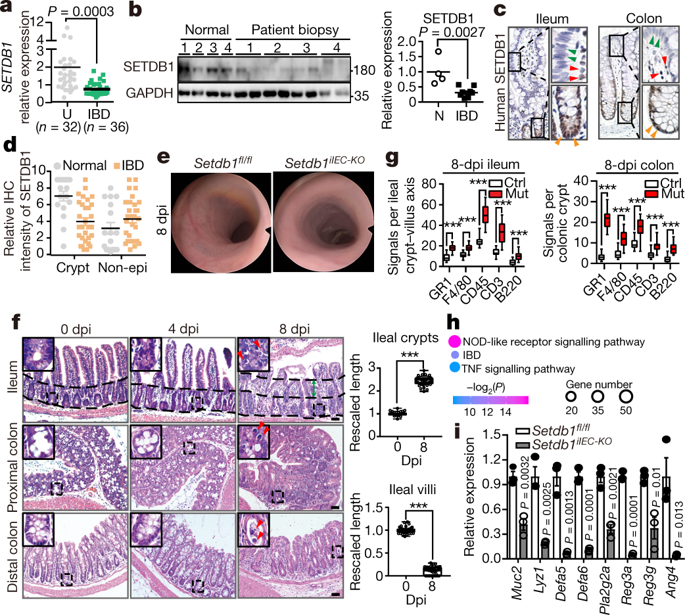Nature ( IF 50.5 ) Pub Date : 2020-03-25 , DOI: 10.1038/s41586-020-2127-x Ruicong Wang 1, 2 , Hongda Li 1, 2 , Jianfeng Wu 1, 2 , Zhi-Yu Cai 1, 2 , Baizhou Li 3 , Hengxiao Ni 1, 2 , Xingfeng Qiu 4 , Hui Chen 5 , Wei Liu 1, 2 , Zhang-Hua Yang 1, 2 , Min Liu 1, 2 , Jin Hu 1, 2 , Yaoji Liang 1 , Ping Lan 6 , Jiahuai Han 1, 2 , Wei Mo 1, 2

|
The aetiology of inflammatory bowel disease (IBD) is a multifactorial interplay between heredity and environment1,2. Here we report that deficiency in SETDB1, a histone methyltransferase that mediates the trimethylation of histone H3 at lysine 9, participates in the pathogenesis of IBD. We found that levels of SETDB1 are decreased in patients with IBD, and that mice with reduced SETDB1 in intestinal stem cells developed spontaneous terminal ileitis and colitis. SETDB1 safeguards genome stability3, and the loss of SETDB1 in intestinal stem cells released repression of endogenous retroviruses (retrovirus-like elements with long repeats that, in humans, comprise approximately 8% of the genome). Excessive viral mimicry generated by motivated endogenous retroviruses triggered Z-DNA-binding protein 1 (ZBP1)-dependent necroptosis, which irreversibly disrupted homeostasis of the epithelial barrier and promoted bowel inflammation. Genome instability, reactive endogenous retroviruses, upregulation of ZBP1 and necroptosis were all seen in patients with IBD. Pharmaceutical inhibition of RIP3 showed a curative effect in SETDB1-deficient mice, which suggests that targeting necroptosis of intestinal stem cells may represent an approach for the treatment of severe IBD.
中文翻译:

基因组不稳定性导致的肠道干细胞坏死性凋亡引发肠道炎症
炎症性肠病 (IBD) 的病因是遗传和环境1,2之间的多因素相互作用。在这里,我们报告了 SETDB1 的缺陷,SETDB1 是一种组蛋白甲基转移酶,可介导组蛋白 H3 在赖氨酸 9 处的三甲基化,参与 IBD 的发病机制。我们发现 IBD 患者的 SETDB1 水平降低,并且肠干细胞中 SETDB1 降低的小鼠出现自发性末端回肠炎和结肠炎。SETDB1 保障基因组稳定性3,而肠道干细胞中 SETDB1 的缺失释放了对内源性逆转录病毒(具有长重复序列的逆转录病毒样元件,在人类中约占基因组的 8%)的抑制。由受激励的内源性逆转录病毒产生的过度病毒模拟触发了 Z-DNA 结合蛋白 1 (ZBP1) 依赖性坏死性凋亡,这不可逆地破坏了上皮屏障的稳态并促进了肠道炎症。基因组不稳定性、反应性内源性逆转录病毒、ZBP1 上调和坏死性凋亡均见于 IBD 患者。RIP3的药物抑制在SETDB1缺陷小鼠中显示出疗效,这表明靶向肠干细胞的坏死性凋亡可能代表治疗严重IBD的方法。











































 京公网安备 11010802027423号
京公网安备 11010802027423号